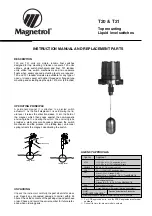
Chapter 3: Featuring Configuration – Web UI
Featuring Configuration – Web UI
NGSME16T2H User Manual | 147
application type should not be advertised if all the same network policies apply as
those advertised in the Guest Voice application policy.
5. Softphone Voice - for use by softphone applications on typical data centric
devices, such as PCs or laptops. This class of endpoints frequently does not support
multiple VLANs, if at all, and are typically configured to use an 'untagged' VLAN or a
single 'tagged' data specific VLAN. When a network policy is defined for use with an
'untagged' VLAN (see Tagged flag below), then the L2 priority field is ignored and
only the DSCP value has relevance.
6. Video Conferencing - for use by dedicated Video Conferencing equipment and
other similar appliances supporting real-time interactive video/audio services.
7. Streaming Video - for use by broadcast or multicast based video content
distribution and other similar applications supporting streaming video services that
require specific network policy treatment. Video applications relying on TCP with
buffering would not be an intended use of this application type.
8. Video Signalling (conditional) - for use in network topologies that require a
separate policy for the video signalling than for the video media. This application
type should not be advertised if all the same network policies apply as those
advertised in the Video Conferencing application policy
Tag
Tag indicating whether the specified application type is using a 'tagged' or an
'untagged' VLAN.
Untagged indicates that the device is using an untagged frame format and as such
does not include a tag header as defined by IEEE 802.1Q-2003. In this case, both
the VLAN ID and the Layer 2 priority fields are ignored and only the DSCP value has
relevance.
Tagged indicates that the device is using the IEEE 802.1Q tagged frame format, and
that both the VLAN ID and the Layer 2 priority values are being used, as well as the
DSCP value. The tagged format includes an additional field, known as the tag
header. The tagged frame format also includes priority tagged frames as defined by
IEEE 802.1Q-2003.
VLAN ID
VLAN identifier (VID) for the port as defined in IEEE 802.1Q-2003.
















































